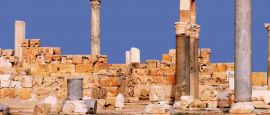Libya Weather, climate and geography
Weather & climate
Summers are very hot and dry; winters are mild with cooler evenings. The desert has hot days and cold nights. Spring and autumn are ideal times to visit, when the warm air comes up from the Sahara and meets a cooling breeze from the Mediterranean.
Libya is a huge country and weather patterns vary by region. The Mediterranean coastline is the focus of most travellers' trips to Libya. There, summers are hot and dry and winters are mild, although the evenings can be worthy of scarves and hats.You'll find similar, though slightly warmer conditions to those on the other side of the ocean, such as southern Italy and Greece. Libya's coastline can be very windy, so be sure to pack a headscarf (women should of course bring one anyway as this is a deeply conservative Muslim country) to protect your ears from being blasted by the breeze.
Rainfall is sporadic and rarely heavy, but drizzly days in autumn and winter are fairly common. Temperatures in Tripoli in January range from 7 to 17°C; in July, you can expect bright sunshine, blue skies and a mercury reading of between 20 and 25°C. In the winter of 2011/12, Libya's coastline had its first snowfall in decades. The desert has hot days and cold nights; the closer to the equator you travel, the hotter the days will be. With the exception of the far southern desert close to Libya's borders with Chad, southern Egypt and Sudan, humidity is generally low.
Loose, long clothes in natural fabrics are recommended. A cover-up for the cooler months is advisable. Warm clothing for nights in the desert. Modest dress is advised, especially for women - upper legs and arms, shoulders and cleavage should be covered. A headscarf can be useful as extra coverage, and is essential for visiting mosques, cemeteries or other sites that bear religious significance.
Do you have any Feedback about this page?
© Columbus Travel Media Ltd. All rights reserved. No part of this site may be reproduced without our written permission, click here for information on Columbus Content Solutions.
¿Tiene comentarios sobre esta página?
© Columbus Travel Media Ltd. All rights reserved. Ninguno de los contenidos de esta Web debe ser reproducido sin nuestra autorización expresa y escrita. Para más información sobre como obtener permiso para la utilización del contenido clica aquí. No part of this site may be reproduced without our written permission, click here for information on Columbus Content Solutions .
Avez-vous des commentairessur cette page?
© Columbus Travel Media Ltd. All rights reserved. Le contenu de ce site ne peut être reproduit sans autorisation écrite. Cliquez ici pour plus d'information sur notre 'des solutions de contenu’. No part of this site may be reproduced without our written permission, click here for information on Columbus Content Solutions.
Haben Sie Feedback zu dieser Seite?
© Columbus Travel Media Ltd. All rights reserved. Alle Inhalte dieser Seite sind urheberrechtlich geschützt und dürfen nur mit schriftlicher Genehmigung des Verlags genutzt werden. Weitere Informationen finden Sie in unseren Lizenzbestimmungen. No part of this site may be reproduced without our written permission, click here for information on Columbus Content Solutions .





 You know where
You know where